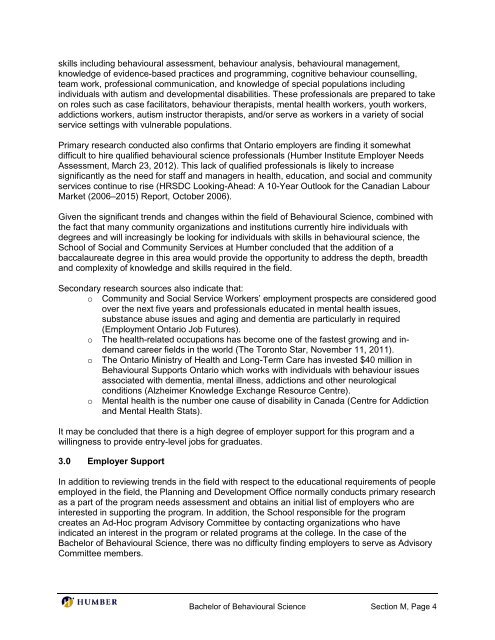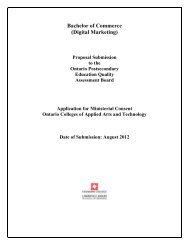Bachelor of Behavioural Science - Postsecondary Education Quality ...
Bachelor of Behavioural Science - Postsecondary Education Quality ...
Bachelor of Behavioural Science - Postsecondary Education Quality ...
Create successful ePaper yourself
Turn your PDF publications into a flip-book with our unique Google optimized e-Paper software.
skills including behavioural assessment, behaviour analysis, behavioural management,<br />
knowledge <strong>of</strong> evidence-based practices and programming, cognitive behaviour counselling,<br />
team work, pr<strong>of</strong>essional communication, and knowledge <strong>of</strong> special populations including<br />
individuals with autism and developmental disabilities. These pr<strong>of</strong>essionals are prepared to take<br />
on roles such as case facilitators, behaviour therapists, mental health workers, youth workers,<br />
addictions workers, autism instructor therapists, and/or serve as workers in a variety <strong>of</strong> social<br />
service settings with vulnerable populations.<br />
Primary research conducted also confirms that Ontario employers are finding it somewhat<br />
difficult to hire qualified behavioural science pr<strong>of</strong>essionals (Humber Institute Employer Needs<br />
Assessment, March 23, 2012). This lack <strong>of</strong> qualified pr<strong>of</strong>essionals is likely to increase<br />
significantly as the need for staff and managers in health, education, and social and community<br />
services continue to rise (HRSDC Looking-Ahead: A 10-Year Outlook for the Canadian Labour<br />
Market (2006–2015) Report, October 2006).<br />
Given the significant trends and changes within the field <strong>of</strong> <strong>Behavioural</strong> <strong>Science</strong>, combined with<br />
the fact that many community organizations and institutions currently hire individuals with<br />
degrees and will increasingly be looking for individuals with skills in behavioural science, the<br />
School <strong>of</strong> Social and Community Services at Humber concluded that the addition <strong>of</strong> a<br />
baccalaureate degree in this area would provide the opportunity to address the depth, breadth<br />
and complexity <strong>of</strong> knowledge and skills required in the field.<br />
Secondary research sources also indicate that:<br />
o Community and Social Service Workers‟ employment prospects are considered good<br />
over the next five years and pr<strong>of</strong>essionals educated in mental health issues,<br />
substance abuse issues and aging and dementia are particularly in required<br />
(Employment Ontario Job Futures).<br />
o The health-related occupations has become one <strong>of</strong> the fastest growing and indemand<br />
career fields in the world (The Toronto Star, November 11, 2011).<br />
o The Ontario Ministry <strong>of</strong> Health and Long-Term Care has invested $40 million in<br />
<strong>Behavioural</strong> Supports Ontario which works with individuals with behaviour issues<br />
associated with dementia, mental illness, addictions and other neurological<br />
conditions (Alzheimer Knowledge Exchange Resource Centre).<br />
o Mental health is the number one cause <strong>of</strong> disability in Canada (Centre for Addiction<br />
and Mental Health Stats).<br />
It may be concluded that there is a high degree <strong>of</strong> employer support for this program and a<br />
willingness to provide entry-level jobs for graduates.<br />
3.0 Employer Support<br />
In addition to reviewing trends in the field with respect to the educational requirements <strong>of</strong> people<br />
employed in the field, the Planning and Development Office normally conducts primary research<br />
as a part <strong>of</strong> the program needs assessment and obtains an initial list <strong>of</strong> employers who are<br />
interested in supporting the program. In addition, the School responsible for the program<br />
creates an Ad-Hoc program Advisory Committee by contacting organizations who have<br />
indicated an interest in the program or related programs at the college. In the case <strong>of</strong> the<br />
<strong>Bachelor</strong> <strong>of</strong> <strong>Behavioural</strong> <strong>Science</strong>, there was no difficulty finding employers to serve as Advisory<br />
Committee members.<br />
<strong>Bachelor</strong> <strong>of</strong> <strong>Behavioural</strong> <strong>Science</strong> Section M, Page 4
















